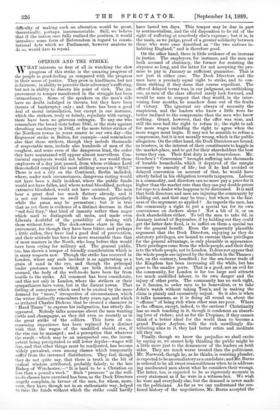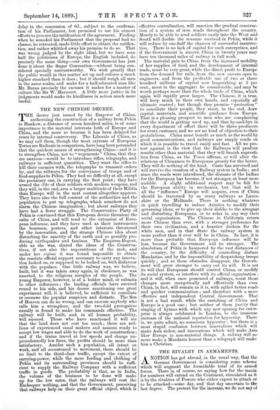OPINION AND THE STRTR - F„ W HAT interests us first of all
in watching the slow progress of this strike is the amazing progress of the people in good-feeling as compared with the progress in their sense of justice. They grow in kindliness, but not in fairness; in ability to perceive their adversary's suffering, but not in ability to discern his point of view. The im- provement in temper manifested in the struggle has been extraordinary. Some of the speakers on the men's side have no doubt indulged in threats, but they have been threats of bankruptcy only ; and there has been a good deal of moral intimidation, but except in one instance, which the strikers, truly or falsely, repudiate with energy, there have been no grievous outrages. To any one who remembers the bread riots before 1845, or the riots against threshing machinery in 1842, or the more bitter strikes of the Northern towns in years nearer to our own day—the Engineers' strike in Bolton, for example—and remembers also that these strikers, though they include thousands of respectable men, include also hundreds of men of the roughest, and some even of the dangerous kind, the order they have maintained will appear almost marvellous. Con- tinental employers would not believe it, nor would those employers of a day just passed, from whose evidence Lord Beaconsfield. compiled the most striking scenes in " Sybil." There is not a city on the Continent, Berlin included, where, under such circumstances, dangerous rioting would not have been a daily incident, where the public funds would not have fallen, and where actual bloodshed, perhaps extensive bloodshed, would not have occurred. The men hear a great deal too much flattery already, and it is not our business to swell the chorus, particularly while the paean may be premature ; but it is true that as yet there is evidence of a distinct decrease in that `•red fool fury," that kind of insanity rather than anger which used to distinguish all mobs, and made even Liberals doubtful of the possibility of dealing with them without force. The dock-owners share in the im- provement, for though they have been bitter, and perhaps a little sullen, they have had a good deal of provocation, and their attitude has been far more reasonable than that of most masters in the North, who long before this would have been crying for military aid. The general public, too, has shown a temper of friendly consideration which is in many respects new. Though the strike has occurred in London, where any such incident is as aggravating as a grain of sand in the eye, and though the principal leader professes tenets which are both detested and scorned, the body of the well-to-do have been far from hostile to the strike. All comment has been considerate, and this not only in London, where the strikers or their sympathisers have votes, but in the distant towns. That feeling of annoyance which used to be excited by the mere demand for "more," irrespective of circumstances, which the writer distinctly remembers forty years ago, and which so irritated Charles Dickens that he created a character in " Hard Times " to express his indignation, has utterly dis- appeared. Nobody talks nonsense about the men wanting turtle and champagne, as they did even so recently as in the great strike of the colliers. This form of un- reasoning impatience has been replaced by a distinct wish that the wages of the unskilled should rise, if the rise can be managed ; and a perception that whatever the result—which may be an unexpected one, the incom- petent being precipitated to still lower depths—wages will rise, and that other things must be readjusted, has become widely prevalent, even among classes which temporarily suffer from the increased distribution. They feel, though they do not quite say, that there is truth in the bit of cynical wisdom attributed, probably falsely, to the late Bishop of Winchester,—" It is hard to be a Christian on less than a pound a week." Such " pressure " as the well- to-do classes have exercised has been, as the Dock Directors angrily complain, in favour of the men, for whom, more- over, they have, though not in an enthusiastic way, helped to raise the funds without which the strike could "hardly have lasted ten days. This temper may be due in part to sentimentalism, and the old disposition to be rid of the sight of suffering at somebody else's expense ; but it is, in the main, as we judge, proof of a greater solidarity between those who were once described as " the two nations in- habiting England," and is therefore good.
On the other hand, there is little evidence of an increase in justice. The employers, for instance, and the men are both accused of obstinacy, the former for resisting the sixpence so long, and the latter for not accepting the pro- mise to pay in January as sufficient guarantee. That is not just in either case. The Dock Directors and the men have a precisely equal right to strike, and to con- tinue striking if they deem that course expedient. The offer of delayed terms was, in our judgment, an unthinking one, as men of the class affected rarely look forward, and would be sure to suspect that they would, in the inter- vening four months, be somehow done out of the fruits of victory. The ignorant are always of necessity the suspicious, and the leaders who know a little were far better inclined to the compromise than the men who know nothing. Grant, however, that the offer was wise, and still the men had the right to refuse it ; the right to ask for more wages including the right to agree when the more wages must begin. It may not be sensible to refuse a compromise, but it is not morally wrong, which is the public allegation. On the other hand, the Dock Directors are bound, as trustees, in the interest of their constituents to haggle in the market-place, and to get for their shareholders the best terms they can. Their first duty is not benevolence. Mr. Goschen's " Conversion " brought suffering into thousands of humble households, which it deprived of the margin necessary to amenity of life ; but if he had avoided or delayed conversion on account of that, he would have utterly failed in his obligation towards taxpayers. Labour is a commodity, and directors can no more pay a price for it higher than the market rate than they can pay double prices for rope to a dealer who happens to be distressed. It is said that both directors and men are injuring the community by holding out, and that may be true ; but where is the fair- ness of the argument so applied ? As regards the men, has the community a right to put a special tax for its own convenience on dockers alone ? Not a. bit of it, or on dock shareholders either. To tell the men to take 6d. in January instead of September, if by bolding out they could. get the latter date fixed, is to inflict on them a special tax for the general benefit. Even the apparently plausible argument that the Dock Directors, enjoying as they do statutory privileges, are bound to exercise those privileges for the general advantage, is only plausible in appearance. Their privileges come from the whole people, and their duty is to the whole people, not to London. It does not appear that the whole people are injured by the deadlock in the Thames ; but, on the contrary, benefited ; for the sea-borne trade of the Kingdom has been increasing all the while, but has gone to the smaller ports. That is a good, not an evil for the community, for London is far too large and attracts too much unskilled labour, to its own danger and the injury of other ports. The community has no such right, as it fancies, to order men to be benevolent, or to take John's watch without taking TOm's, and in. making the claim is plainly and excessively unjust. So it also is when it talks nonsense, as it is doing all round us, about the " offence" of being rich when other men are poor. Where is the offence, except, indeed, to the envious ? Christianity has no such teaching in it, though it condemns an absorb- ing love of riches ; and as for the Utopians, if they cannot think of a better ideal for the world than to become a grand Pauper Asylum, with the rich unwillingly dis- tributing alms in it, they had better retire and meditate till they can.
Finally, though we know the prejudice we shall excite by saying so, we cannot help thinking the public might be a little more just to the demeanour of the leaders on both sides. They are much worse treated than the politicians. Mr. Norwood, though he, as he thinks, is resisting plunder, is expected to be as conciliatory as a candidate; anditIr. Burns is ordered to be all sweet reasonableness when he is address- ing uneducated men about what he considers their wrongs. The latter, too, is expected to be as rigorously accurate in every statement as if he were in a witness-box. We wish he were and everybody else, but the demand is never made on the politicians. As far as we can understand the con- fused. history of the negotiations, Mr. Burns accepted the delay in the concession of 6d., subject to the confirma- tion of his Parliament, but promised to use his utmost efforts to procure the ratification of the agreement. Finding when he sounded his Parliament that the proposal had no chance, he retreated, made little effort to obtain the ratifica- tion, and rather whittled away his promise to do so. That was wrong judged by the right ideal, but we have seen half the politicians of Europe, the English included, do precisely the same thing—our own Government has just done it about the Sugar Convention—without being con- sidered specially untrustworthy. We wish greatly that the public would in this matter set up and enforce a much higher standard than it does ; but it should weigh all men in the same scales, and make for a half-educated man like Mr. Burns precisely the excuses it makes for a master of culture like Sir W. Harcourt. A little more justice in its judgments would make its kindliness in action much more useful.



































 Previous page
Previous page